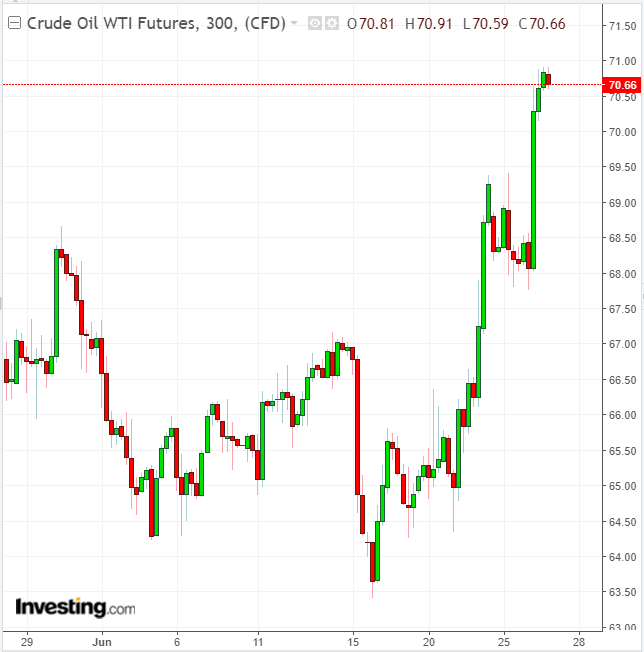Oil prices are surging. But the reasons have less to do with OPEC's oil production increase, announced last Friday, and more to do with not as prominent catalysts.

Though oil prices moved decisively higher after OPEC's announcement at the end of last week, with Brent crude jumping about 3% and the U.S. benchmark WTI gaining more than 4% on the Organization of Petroleum Exporting Countries (OPEC) decision, the additional gains are being fueled by two specific drivers:
- OPEC's original announcement was vague and deceptive. On Friday the cartel made it appear as though the production increase would be less than the market had expected. OPEC may have been forced to present such an image on Friday in order to satisfy Iran’s political considerations.
- A key supplier of Canadian crude oil to the United States, Syncrude, announced on Friday that crude oil exports of around 300,000 bpd to the U.S. would be halted for the remainder of June as well as for all of July, at least. The company suffered a power outage last week and is working to fix the faulty transformer at its Alberta facility.
A closer examination of the timeline for the OPEC announcement shows that the much-focused on Friday release only broadcast an incomplete version of the agreement. The following day, representatives from Russia, Kazakhstan, Azerbaijan, Oman and other countries joined OPEC to negotiate a larger agreement on production quotas for the remainder of 2018. It was actually only then decided that the group would increase oil production. Although the group is technically targeting an increase of 1 million bpd, many analysts expect the increase will only be about 600,000 bpd, because some countries (such as Venezuela and Angola) are currently incapable of increasing beyond their current production numbers.
Indeed, production numbers from Venezuela are expected to continue dropping. Short-term production from OPEC member Libya is also in jeopardy as fires last week destroyed a number of Libya’s export storage tanks and reduced its export capacity by 450,000 barrels.
Russia and OPEC made clear at the Saturday meeting that countries with spare capacity would be tasked with increasing production to replace barrels lost from Venezuela and other countries. The Joint Ministerial Monitoring Committee (JMMC) will allocate those increases to Saudi Arabia, Russia, the UAE, Kuwait and others as necessary.
Even though Saudi oil minister Khalid al Falih said that the group would be careful not to increase too quickly and flood the market, Saudi Arabia has already announced that it will produce 10.8 million bpd in June. That would be a record amount of production for Saudi Arabia.
Aramco, the Saudi national oil company, recently revealed that it plans to produce 11 million bpd in July. Saudi Aramco's CEO Amin Nasser clarified that Aramco, which produced 10.01 million bpd in May, can generate about 12 million bpd, if needed. (Keep in mind that Saudi Arabia’s domestic oil consumption always spikes in the summer).
Both Brent and WTI dropped when futures markets opened Sunday night. However, because of the Syncrude outage, WTI fell much less sharply than Brent. This has tightened the spread between Brent and WTI, which had grown as much as $10 per barrel earlier in the month.
The Syncrude outage means that the price of the Canadian benchmark, West Canadian Select (WCS), should rise during the coming weeks. It had been selling at a significant discount.
We should also expect to see reports that oil production in the Permian (in Texas) is slowing, as some companies cut production due to transportation bottlenecks. Pioneer Resources (NYSE:PXD) announced that it plans to shut wells in the Permian within the next 4 months. Other companies are likely to follow, because there is a paucity of pipeline capacity. The overall growth forecast for shale oil-producing regions of the U.S. is still strong, but some companies will struggle in the short-term as they face transportation shortages.
Meanwhile, traders should pay attention to the developing situation with Iran. On Tuesday, the Trump administration pushed big buyers of Iranian crude, primarily Asian countries, to halt all purchases of Iranian crude oil before sanctions come into full effect in November.
This is significantly harsher than U.S. policy in 2012, which granted waivers to Asian importers of Iranian crude. The 2012 policy allowed Asian markets to continue importing Iranian crude as long as they progressively reduced the amount they imported. The current policy could keep crude oil prices elevated this summer even as Saudi Arabia, Russia and other producers ramp up production.
